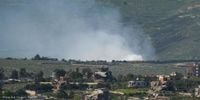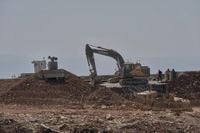On August 25, 2025, Israeli Prime Minister Benjamin Netanyahu announced that Israel is prepared to support Lebanon’s efforts to disarm Hezbollah, signaling a potential turning point in the decades-long conflict between the two neighbors. The announcement, which followed a series of high-level meetings with U.S. officials, set off a flurry of diplomatic activity and heated debate within Lebanon, Israel, and the international community.
Netanyahu’s statement came after the Lebanese cabinet’s early August vote to approve a U.S.-backed plan for the Lebanese Armed Forces (LAF) to disarm the Iran-backed Hezbollah group by the end of 2025. According to Reuters, the Israeli prime minister’s office described Lebanon’s decision as “momentous” and a “significant step” towards regional stability. Netanyahu declared, “Israel stands ready to support Lebanon in its efforts to disarm Hezbollah and to work together towards a more secure and stable future for both nations.” He emphasized that if the LAF took the necessary steps, Israel would reciprocate with a “phased reduction of IDF presence in coordination with the U.S.-led security mechanism.”
The context for this development is complex. Since the November 2024 ceasefire that ended a 14-month war between Israel and Hezbollah, Israeli forces have maintained a presence in five strategic outposts in southern Lebanon. The ceasefire, brokered by the United States, stipulated that Israel withdraw its troops within two months, while the LAF would take control of southern Lebanon—territory long dominated by Hezbollah. However, as AP reports, disputes over the interpretation and sequencing of the agreement have persisted. Hezbollah insists that Israeli withdrawal and a halt to airstrikes must come before any discussion of disarmament. Israeli officials, meanwhile, argue that any military drawdown must be contingent on concrete Lebanese action against Hezbollah’s arsenal.
The latest Israeli offer was issued a day after Netanyahu and Israeli Minister for Strategic Affairs Ron Dermer met with U.S. envoy Tom Barrack, Deputy Special Envoy Morgan Ortagus, and U.S. Ambassador Mike Huckabee to discuss Lebanon and Syria. After the meeting, Barrack publicly pressed Israel to fulfill its obligations under the ceasefire, stating, “The Lebanese government has done their part. Now what we need is for Israel to comply with that equal handshake.” This sentiment was echoed by other U.S. officials, who see Lebanon’s cabinet vote as a necessary first step toward lasting peace.
Yet, the path forward is anything but straightforward. Hezbollah’s leadership has categorically rejected the disarmament plan. In a televised speech on August 25, Hezbollah chief Naim Qassem warned that any attempt by the Lebanese government to seize the group’s weapons before an Israeli withdrawal would provoke civil unrest. “The weapon that brought us dignity, we will not abandon. The weapon that protects us from our enemy, we will not give up on,” Qassem declared, according to Reuters. He further insisted that talks on a national defense strategy could only begin once Israel fully implements the ceasefire.
Hezbollah’s stance is rooted in its self-styled role as Lebanon’s defender against Israeli aggression. Despite the group’s withdrawal of most fighters and weapons from the border area south of the Litani River after the 2024 war, Israeli intelligence continues to accuse Hezbollah of rebuilding its military capabilities in violation of the ceasefire. The five Israeli-controlled positions in Lebanon, which the military describes as essential for protecting northern Israeli communities, remain a sticking point. About 60,000 Israelis were displaced during the conflict, and Israeli Defense Minister Israel Katz has stated that troops will remain at these outposts “indefinitely.”
The Lebanese government, meanwhile, finds itself caught between mounting international pressure and the risk of internal upheaval. As AP and Reuters both note, Lebanon’s leaders are keenly aware that billions of dollars in international aid for postwar reconstruction hinge on progress toward disarming Hezbollah. The World Bank estimates that the 2024 war caused $11.1 billion in damages, leaving large swathes of southern and eastern Lebanon in ruins. Yet, any move perceived as capitulating to Israeli or American demands risks igniting sectarian tensions and possibly plunging the country back into civil conflict.
Lebanese presidential advisor Mohammad Obeid recently sought to reassure Hezbollah’s parliamentary bloc that the cabinet’s decision would not be implemented until Israel withdraws from southern Lebanon and halts its airstrikes. A senior Lebanese government official, speaking to Reuters, dismissed Netanyahu’s offer as “only half a solution,” arguing that Israel must first commit to a full cessation of hostilities. “With this offer, Israel is falling short of a full solution,” the official said, accusing Netanyahu of trying to put Lebanon in a difficult position.
International actors are now working feverishly to bridge the gap between the competing proposals. According to Hussain Abdul-Hussain, a research fellow at the Foundation for Defense of Democracies (FDD), “Opponents of the Lebanese cabinet’s plan to disarm Hezbollah were betting Israel would reject it but were surprised that Jerusalem endorsed the plan instead, with the caveat that the sequencing as spelled out by Netanyahu’s statement was different from the U.S.-Lebanese outline. U.S. diplomats will now need to align the two proposals seamlessly, leaving no opening for Hezbollah to avoid disarmament.”
Not everyone is convinced that Netanyahu’s overture is well-timed. David Daoud, a senior fellow at FDD, cautioned, “Prime Minister Netanyahu’s statement is premature. The LAF’s disarmament plan has not even been submitted to the government, which may still buckle under Hezbollah’s pressure and fail to approve it. Any Israeli conciliatory gestures — be they withdrawal from south Lebanon or cessation of operations — must come gradually, after Lebanon begins to act against Hezbollah and demonstrates it will maintain course, not after mere words that are retracted as easily as they are issued.”
The stakes could hardly be higher. The war that began in September 2024, following a year of low-level conflict sparked by Hezbollah’s support for Hamas after the October 7, 2023, attack on Israel, left more than 4,000 people dead and the region deeply scarred. Now, with both sides under pressure to demonstrate flexibility, the coming weeks may determine whether Lebanon and Israel can finally break the cycle of violence—or whether old grievances and mistrust will once again prevail.
For now, the world watches and waits as Lebanon’s government and military prepare to finalize their disarmament plan. As the international community weighs in and regional actors maneuver for advantage, the fate of Hezbollah’s arsenal—and the fragile peace along the Israel-Lebanon border—hangs in the balance.


